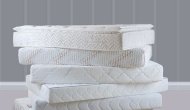There are a variety of factors that have an impact on mattress comfort. These factors include firmness, support, and how they help you with pain.
How difficult has it been for you to find a comfortable mattress? Considering that one in four Canadians, 25%, have reported that they have trouble staying asleep or falling asleep all or most of the time, it might be very difficult.
This could be for various reasons. Maybe some people have sleep issues, such as sleep apnea—or they have an anxiety disorder that makes it difficult for them to sleep at night. For others, however, it might just be a mattress issue.
If it's an issue with your mattress that's causing you to sleep less, we can help. In this article, we'll review the science behind mattress comfort. To learn more, keep reading.
Overview: Mattress Comfort Science
1. Mattress Firmness
2. The Difference Between Firmness and Support
3. Best Mattresses for Pain
4. Mattress Comfort Science Tips
Mattress Firmness
One of the mattress comfort factors you need to know to understand the science of mattress comfort before buying a mattress is mattress firmness. How firm a mattress is depends on how firm or soft it feels when you're lying on it.
It's important to note that firmness and support are different factors since people sometimes get these two confused.
Firmness Scale
While different companies might have different firmness scales of their own, here's one you can follow to help guide yourself when you're looking at mattresses online or testing ones out in person at a mattress store. This scale works from ratings one to 10.
Extra Soft
When a mattress is extra soft, it has a firmness that falls between the ratings of one and two. It's extremely plush. Even though an extra soft mattress might seem like a dream to sleep on, it likely won't provide you with the support you need.
Soft
The next firmness level is soft (levels three to four). When a mattress has this firmness level, its firmness falls between the ratings of three and four. When someone lies down on the mattress, it will go down between 1.5 and 3 inches—meaning that it has a "sinkage level" between 1.5 and 3 inches.
Soft mattresses usually come in two different varieties. These include traditional memory foam deep contour and deep cushion hug types.
A soft bed is ideal for someone who prefers sleeping on their side. It's also a good fit for someone who weighs less than 130 pounds.
Medium
After soft, comes medium, which covers levels five to six. Most people choose this type of mattress firmness. Level six is the average that most people go for, though sometimes people prefer a slightly softer medium feel, which is what level five offers them.
Medium-firmness beds are great for a variety of sleeping positions. For this reason, this is a great bed option if you're a combination sleeper.
Hard
Hard beds provide a firmness that's between slightly firm and firm. The range of levels that they cover is seven to eight. This bed type could be a good choice for you if you prefer sleeping on your stomach or your back.
Extra Hard
Finally, there's the extra hard mattress firmness level, which ranges from nine to 10. This is the hardest type of mattress, with only a minority of people interested in buying it. As a result, it's rare, and few mattress stores sell it.
Choosing the Right Firmness for You
Now that you know what the different firmness levels are, you can choose mattresses based on firmness levels. However, how do you know which firmness level is the best one for you? We'll review here how you can choose the right firmness for you.
A soft mattress is a good choice for someone whose weight is light or average. Additionally, it's ideal for side sleepers.
A medium mattress is a good choice for someone whose weight is heavy, average, or light. Additionally, it's ideal for back, stomach, and side sleepers.
A firm mattress is a good choice for someone whose weight is heavy. Additionally, it's ideal for back and stomach sleepers.
The Difference Between Firmness and Support
While it can be easy to think that firmness and support are the same, they aren't. Firmness is related to how hard or soft the mattress feels when you first lie on it.
Support, on the other hand, has to do with whether or not the bed works in such a way that it puts your spine in a position of perfect alignment.
Best Mattresses for Pain
Depending on what pain you're experiencing, some mattresses are better than others. If you're experiencing back pain, then you need a mattress that helps in aligning your spine as optimally as possible—while still assisting with pressure points.
As for hip pain, it's best to get a mattress that offers pressure relief. This is especially the case for those with hip pain who are side sleepers. The best mattresses for this type of pain are medium- to soft-firm choices.
Finally, if you're experiencing shoulder pain, you should avoid getting a mattress that has a firmness level that's too high.
This is because the firmness won't be able to give enough cushioning to press against your shoulders. For people who have a preference for sleeping on their sides, this is especially true.
If you have shoulder pain, we recommend going for a medium or soft mattress with a firmness level that's between four and five.
Mattress Comfort Science Tips
There are other tips related to the science of mattresses. For example, have you ever wondered about off-gassing, foam mattress materials, foam mattress build, latex, or mites? We'll go into science tips about these topics and more now.
Off-Gassing
Off-gassing can happen with several home items, such as new cars, kitchen worktops, new paint, and mattresses. This is something that happens with many mattresses.
The only types of mattresses this doesn't happen with are ones that are 100% made out of natural latex.
Memory Foam Chemicals
Something else people sometimes worry about when it comes to chemicals that are in mattresses is foam mattresses. However, memory foam has at this point been around for 20 years and hasn't shown that there are any issues.
This said, if you don't feel comfortable buying a memory foam mattress for sale, you can always buy a mattress that is 100% made of latex.
Memory Foam Comfort Zones
If you come across a bed that has memory foam and comfort zones, be cautious. Ask the retailer or manufacturer to show you how the different memory foam comfort zones are constructed.
If it isn't made correctly, you'll just end up with a variety of different memory foam pieces stitched together.
In the case in which you're looking for a bed that has comfort zones, you're best off getting a pocket-sprung mattress. This is because, when someone zones a mattress made of foam, this breaks up the foam's consistency.
Dust Mites
You might also be interested in learning about dust mites. These can occur when there's a combination of dead skin, warmth, and moisture. Latex is naturally resistant to mites. However, other parts of your bed can cause dust mites to be present where you sleep.
These include the bedding itself. Additionally, the state of your home or the clothes you sleep in can cause dust mites to be present.
How Long Mattresses Last
How long a mattress lasts depends on what type of mattress it is. An all-foam mattress usually lasts between eight and 10 years, though if it's made of gel, it can last even longer. Latex mattresses are the most long-lasting and can last 25 years.
Hybrid mattresses, which are made from a textile, foam, and coil combination, will last less time than latex mattresses. However, they can be worth getting given that they provide you with comfort both over time and straight away.
Keep in mind, however, that the quality of the springs in the bed is incredibly important when it comes to longevity. If they're low-quality, the bed can last as little as five years.
Need More Information?
Now that you've learned about the science of mattress comfort, you might need more information. Maybe you're looking for a mattress sale in Toronto or you've recently been Googling "mattress store near me" but don't know where to go shopping.
Whether you're looking for a mattress sale or a mattress store, the place to go in the local greater Toronto area is Mattressville. If you need more help shopping for a new mattress, try our online mattress shopping assistant, the Mattress Matchmaker.
This easy-to-use mattress selector is designed to help find the best mattress. You are also always welcome to visit us in Mississauga near Toronto. You can trust Mattressville to help you have a good night, every night!










